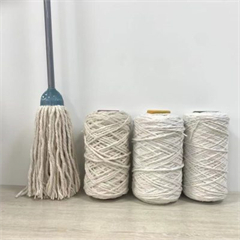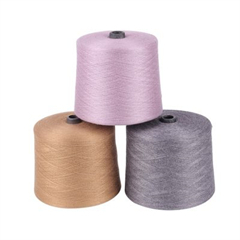Jute yarn carries an inherent eco-friendly charm that stems from its sustainable cultivation, biodegradability, and versatility. Here are several aspects that highlight the eco-friendly qualities of jute yarn:
- Renewable Resource: Jute is a natural plant fiber derived from the jute plant, which is primarily grown in regions like India and Bangladesh. It is a renewable resource that can be harvested annually, making it a sustainable alternative to synthetic materials.
- Biodegradability: Jute yarn is biodegradable, meaning it breaks down naturally over time without releasing harmful toxins or pollutants into the environment. This characteristic reduces the burden on landfills and minimizes long-term environmental impact.
- Low Carbon Footprint: Jute cultivation and processing have a relatively low carbon footprint compared to the production of synthetic fibers. It requires less water and chemical inputs, leading to reduced greenhouse gas emissions.
- Minimal Chemical Usage: Jute farming typically involves minimal pesticide and fertilizer usage compared to other crops like cotton. This reduces chemical runoff into soil and water systems, benefiting ecosystems and wildlife.
- Natural Appearance: Jute yarn retains its natural color and texture, reducing the need for energy-intensive dyeing processes often used in the textile industry. This natural appearance adds to its eco-friendly appeal.
- Sustainable Farming Practices: Jute cultivation often employs sustainable farming practices like crop rotation, which helps maintain soil fertility and reduces the need for synthetic fertilizers.
- Versatility: Jute yarn’s versatility allows it to replace less eco-friendly materials in various applications, including textiles, packaging, and construction. Its use can contribute to reducing the overall environmental impact of these industries.
- Eco-Friendly Products: Jute yarn is used to create a wide range of eco-friendly products, such as reusable shopping bags, home decor items, and clothing. These products offer consumers sustainable alternatives to synthetic counterparts.
- Support for Rural Communities: Jute cultivation and processing provide employment opportunities in rural areas, often in developing countries where economic opportunities can be limited. This supports local communities and contributes to their well-being.
- Eco-conscious Consumer Choice: As awareness of environmental issues grows, consumers are increasingly seeking eco-friendly products. Jute yarn’s eco-friendly qualities make it an attractive choice for those looking to make sustainable purchasing decisions.
- Erosion Control: Jute mesh or netting made from jute yarn is used for erosion control in landscaping and environmental restoration projects. It stabilizes soil, prevents erosion, and eventually biodegrades without harming the ecosystem.
- Reduction of Plastic Use: Jute yarn is often used as an alternative to synthetic materials like plastic for packaging, reducing the consumption of non-biodegradable plastics and their negative environmental impact.
The eco-friendly charm of jute yarn lies in its ability to provide sustainable solutions across various industries while minimizing harm to the environment. Its appeal extends not only to environmentally conscious consumers but also to businesses and industries looking to adopt more sustainable practices and materials.






















